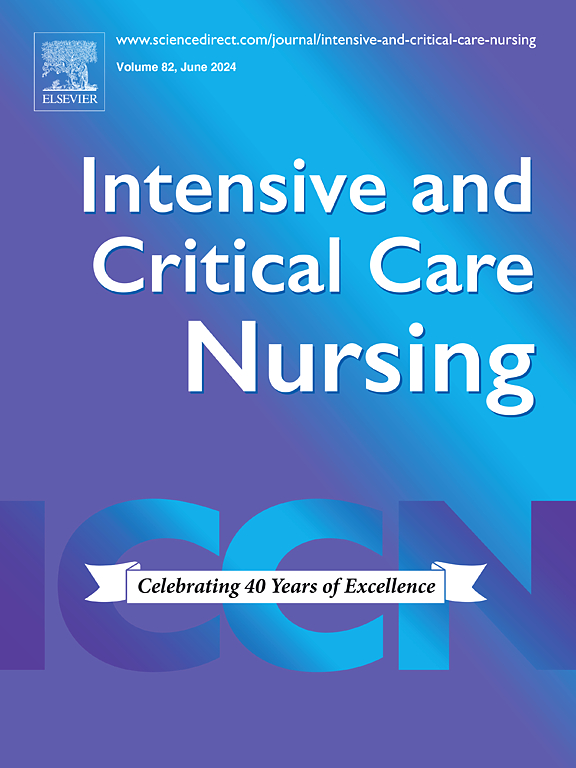非药物睡眠干预对ICU术后患者谵妄预防和睡眠改善的影响:系统综述和网络荟萃分析
IF 4.9
2区 医学
Q1 NURSING
引用次数: 0
摘要
目的:分析不同非药物睡眠干预措施对预防ICU术后患者谵妄的效果。研究方法:我们对PubMed、Cochrane Library、Web of Science、Embase、CINAHL、OpenGrey和参考文献进行了全面检索,检索截止到2024年5月。背景:我们系统地检索了所有与非药物睡眠干预预防谵妄相关的随机对照试验。结果:网络荟萃分析结果显示,与常规护理相比,多组分干预是预防ICU术后患者谵妄最有效的措施(RR = 0.32, 95% CI = 0.20 ~ 0.51)。其次是旨在缓解压力的非药物睡眠干预(RR = 0.60, 95% CI = 0.41至0.89)和昼夜节律(RR = 0.61, 95% CI = 0.39至0.96)。此外,关注昼夜节律的非药物睡眠干预表明,术后ICU患者的睡眠质量得到改善(SMD = -0.99, 95% CI = -1.88至-0.11)。结论:本研究发现,多组分非药物睡眠干预可有效降低ICU术后患者谵妄的发生率。此外,专注于昼夜节律调节的非药物干预措施显著提高了这些患者的睡眠质量。对临床实践的启示:基于本研究,重症监护病房和护理人员有机会实施最有效的非药物睡眠干预措施,以预防谵妄和改善ICU术后患者的睡眠质量。这可能有助于降低ICU术后患者谵妄的发生率。本文章由计算机程序翻译,如有差异,请以英文原文为准。
The Impact of Non-Pharmacological Sleep Interventions on Delirium Prevention and Sleep Improvement in Postoperative ICU Patients: A Systematic Review and Network Meta-Analysis
Objectives
Analyze the effectiveness of different non-pharmacological sleep interventions in preventing delirium among postoperative ICU patients.
Research methodology
We conducted a comprehensive search on PubMed, Cochrane Library, Web of Science, Embase, CINAHL, OpenGrey and reference lists up to May 2024.
Setting
We systematically searched all randomized controlled trials related to non-pharmacological sleep interventions for the prevention of delirium.
Results
The results of the network meta-analysis showed that, compared to Usual Care, multicomponent interventions are the most effective measures for preventing delirium in postoperative ICU patients (RR = 0.32, 95 % CI = 0.20 to 0.51). This is followed by non-pharmacological sleep interventions aimed at stress relief (RR = 0.60, 95 % CI = 0.41 to 0.89) and circadian rhythm (RR = 0.61, 95 % CI = 0.39 to 0.96). Additionally, non-pharmacological sleep interventions focusing on circadian rhythm demonstrated an improvement in sleep quality among postoperative ICU patients (SMD = −0.99, 95 % CI = −1.88 to −0.11).
Conclusions
Our study found that multicomponent non-pharmacological sleep interventions are effective in reducing the incidence of delirium in postoperative ICU patients. Furthermore, non-pharmacological interventions focused on circadian rhythm regulation significantly enhance sleep quality among these patients.
Implications for clinical practice
Based on this study, intensive care units and nursing staff have an opportunity to implement the most effective non-pharmacological sleep interventions to prevent delirium and improve sleep quality in postoperative ICU patients. This could contribute to a reduction in the incidence of delirium in postoperative ICU patients.
求助全文
通过发布文献求助,成功后即可免费获取论文全文。
去求助
来源期刊

Intensive and Critical Care Nursing
NURSING-
CiteScore
6.30
自引率
15.10%
发文量
144
审稿时长
57 days
期刊介绍:
The aims of Intensive and Critical Care Nursing are to promote excellence of care of critically ill patients by specialist nurses and their professional colleagues; to provide an international and interdisciplinary forum for the publication, dissemination and exchange of research findings, experience and ideas; to develop and enhance the knowledge, skills, attitudes and creative thinking essential to good critical care nursing practice. The journal publishes reviews, updates and feature articles in addition to original papers and significant preliminary communications. Articles may deal with any part of practice including relevant clinical, research, educational, psychological and technological aspects.
 求助内容:
求助内容: 应助结果提醒方式:
应助结果提醒方式:


